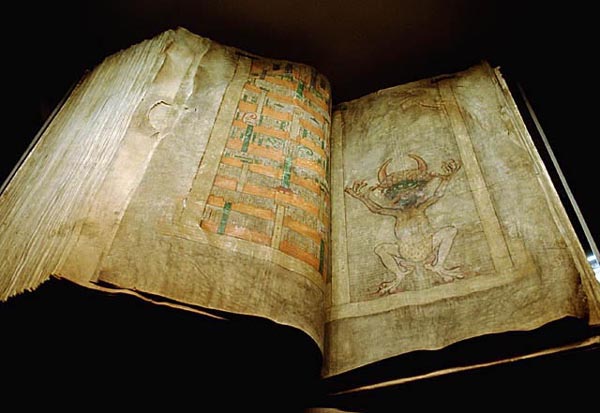
Codex Gigas (source: wikipedia)
Jesus Christ is the Word of God in the flesh.
We declare to you what was from the beginning, what we have heard, what we have seen with our eyes, what we have looked at and touched with our hands, concerning the word of life. (1 John 1:1 NRSV)
How do we then come to say anything about him? Is it an appeal to ancient symbols, confessions, church history, scripture, or something else? Have we spoken truthfully about the Word of God? How do we know that we have not created a myth rather than proclaimed the crucified Word of God?
In the following quotation from the Church Dogmatics IV.2, Karl Barth writes that we ultimately have only an appeal to scripture, and even the scriptures are not a final basis of knowledge.
The question cannot be postponed any longer: How do we really know what we have declared and developed, and especially the decisive and central fact from which all the rest derives, that Jesus Christ was and is and will be the eternal Word of God in our flesh, the Son of God who becomes and is also the Son of Man, in whom, therefore, our human essence is exalted to fellowship with God? How do we really know that there is anything at all corresponding to what we have described in these formulations, and if there is, that it is actually in the one Jesus Christ? How does it come about that dogmatics has to reckon with this fact as with a prescribed text which it has only to read and expound?
For that is what we have done. Have we only been speculating about an arbitrarily presupposed or freely invented concept? Have we created a myth? That would be a sorry state of affairs. But are we really sure that it is not the case? Or, to justify our actions, can we only refer back to the Church, to its symbols and confessions in which that which is here presupposed is indeed solemnly and authoritatively handed down to us? Or can we appeal only to the history of Christian theology, in the continuity of which we are now working, and which has always set out directly or indirectly from this presupposition, both in its classical and its less classical forms, and with a larger or smaller degree of agreement or divergence? But is this really satisfactory? Even the whole Church and all its dogmas and theologians might be mistaken when it counts on this presupposition. We have to ask therefore, as Evangelical Christians, on what grounds we can recognize the authority of the Church, and appeal to it and accept its presupposition. There remains the appeal to Holy Scripture. The Church's symbols and confessions arose as summaries and repetitions and expositions of the scriptural witness to Jesus Christ. But perhaps the Church misunderstood Scripture when it took from it this presupposition. And, above all, even if we grant that the biblical authors really did bear this witness, how did they come to do it? Can we trust them unconditionally in respect of their hearing and seeing of this factor, and their reproduction or interpretation of what they saw and heard. The answer that we hold to this face, and start from it, because it is attested as such in the Bible, is not to be rejected. It can have a true sense. But it must have this true sense if we are to accept it with a good conscience. And this true sense is not the "fundamentalist" one, which would have it that the sacred text as such is the proper and final basis of knowledge.
Barth, Karl. Trans. Geoffrey W. Bromiley. Ed. Geoffrey W. Bromiley and T. F. Torrance. Church Dogmatics: IV.2 The Doctrine of Reconciliation, 24. London: T & T Clark, 2010. 118-19. Print. Study Edition.



September 19th, 2014 - 14:24
What does Barth say is the proper and final basis of knowledge?
September 19th, 2014 - 18:30
In Karl Barth’s Church Dogmatics I/1 he answers that it is in the Word of God in its Threefold form: Revealed, Written and Proclaimed and these three are in Unity.